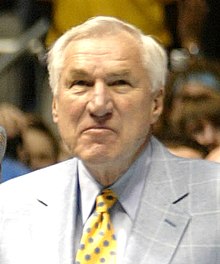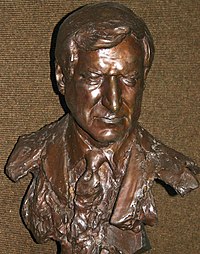Dean Smith
[3][4] While at North Carolina, Smith helped promote desegregation by recruiting the university's first African-American scholarship basketball player, Charlie Scott, and pushing for equal treatment for African Americans by local businesses.
[7] Smith's father, Alfred, coached the Emporia High Spartans basketball team to the 1934 state title in Kansas.
[12] He later worked as a head coach of United States Air Force Academy's baseball and golf teams.
Smith won his first national championship with his 1981–82 team, which was composed of future NBA players such as Michael Jordan, James Worthy and Sam Perkins.
The Hoyas missed a halfcourt shot as time expired, giving Smith his first national championship in his seventh appearance in the Final Four.
Dean Smith's 1992–93 squad featured George Lynch, Eric Montross, Brian Reese, Donald Williams, and Derrick Phelps.
North Carolina bounced back with nine straight wins before losing back-to-back road games against unranked Wake Forest and #5 Duke.
North Carolina beat #14 Wake Forest and #6 Duke to close out the regular season and clinch the top seed in the ACC tournament.
The 1993 national title game was a see-saw battle throughout, but is remembered best for Chris Webber calling a time-out while trapped against the sideline by two defenders.
Michigan was assessed a technical foul and North Carolina ended up winning 77–71, giving Smith his second national championship.
[24] With such short notice of Smith's retirement, Bill Guthridge, who had been his assistant for 30 years, succeeded him as head coach.
In 2003 Smith talked to Roy Williams regarding his decision about whether or not to replace a struggling Matt Doherty as head coach.
[27] Shortly after, Smith's family released a letter stating that he had a "progressive neurocognitive disorder", which had not been publicly disclosed as Alzheimer's or anything else.
But they generally featured a fast-break style, a half-court offense that emphasized the passing game, and an aggressive trapping defense that produced turnovers and easy baskets.
Smith was credited with creating or popularizing the following basketball techniques: The "tired signal", in which a player would use a hand signal (originally a raised fist) to indicate that he needed to come out for a rest,[29][30] huddling at the free throw line before a foul shot,[29][30] encouraging players who scored a basket to point a finger at the teammate who passed them the ball, in honor of the passer's selflessness,[29][30] instituting a variety of defensive sets in one game,[29][31] having the point guard call out the defense set for the team,[29][31] and creating a number of defensive sets, including the point zone, the run-and-jump, and double-teaming the screen-and-roll.
[9] Strategically, Smith was most associated with his implementation of John McLendon's four corners offense, a strategy for stalling with a lead near the end of the game.
Smith's teams executed the four corners set so effectively that in 1985 the NCAA instituted a shot clock to speed up play and minimize ball-control offense.
[9][32] Although fellow Kansas alum McLendon actually invented the four corners offense, Smith got credit for utilizing it in games.
[33] In a season when the team included six seniors, he put all six on the floor at the beginning of the game – drawing a technical foul – rather than leave one of them out.
Smith took a picture of the scoreboard from the 1982 Championship, modified it to read 1993 and erased the name Georgetown, leaving that space blank.
[22] Student athletes under Smith achieved a graduation rate of 96.6% at North Carolina,[3][4] and he established a reputation for running a clean program.
[35] Smith married Ann Cleavinger in 1954, shortly before his deployment overseas with the United States Air Force.
He was one of five, along with Oscar Robertson, Bill Russell, John Wooden and Dr. James Naismith, selected to represent the inaugural class.
In 1964, Smith joined a local pastor and a black North Carolina theology student to integrate The Pines, a Chapel Hill restaurant.
He also integrated the Tar Heels basketball team by recruiting Charlie Scott as the university's first black scholarship athlete.
[5] In 1965, Smith helped Howard Lee, a black graduate student at North Carolina, purchase a home in an all-white neighborhood.
[9] He opposed the Vietnam War and, in the early 1980s, famously recorded radio spots to promote a freeze on nuclear weapons.
[49] While coach, he was recruited by some in the Democratic Party to run for the United States Senate against incumbent Jesse Helms.
[49][dead link][50] Although a staunch Democrat, Smith did support one of his former players, Richard Vinroot, a Republican who ran for governor of North Carolina in 2000.
[54] One hallmark of Dean Smith's tenure as coach was the concept of the "Carolina Family," the idea that anyone associated with the program was entitled to the support of others.




